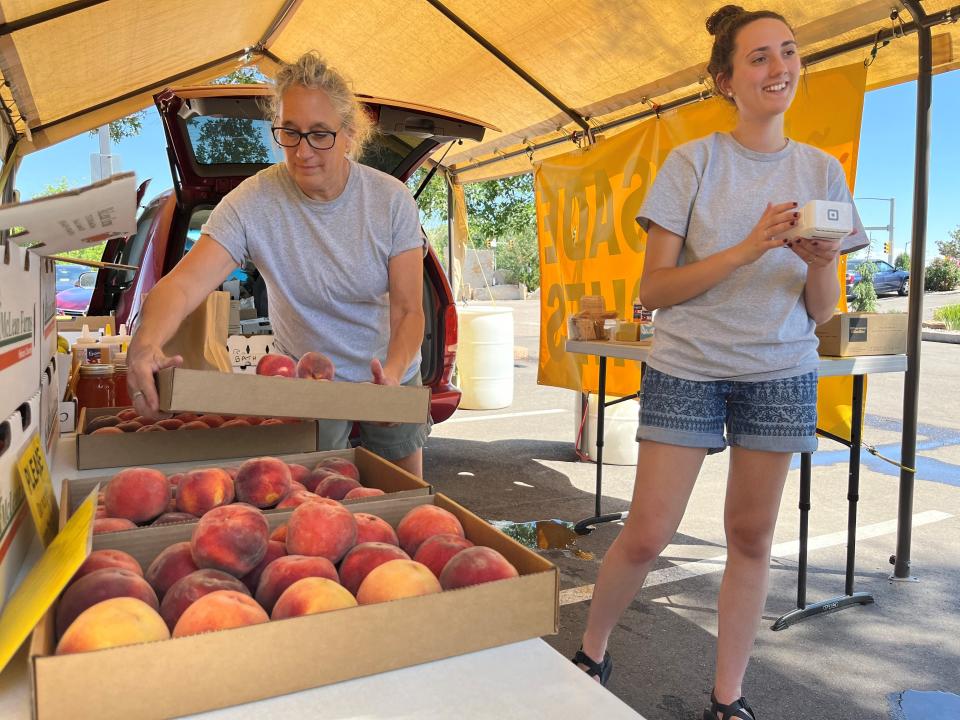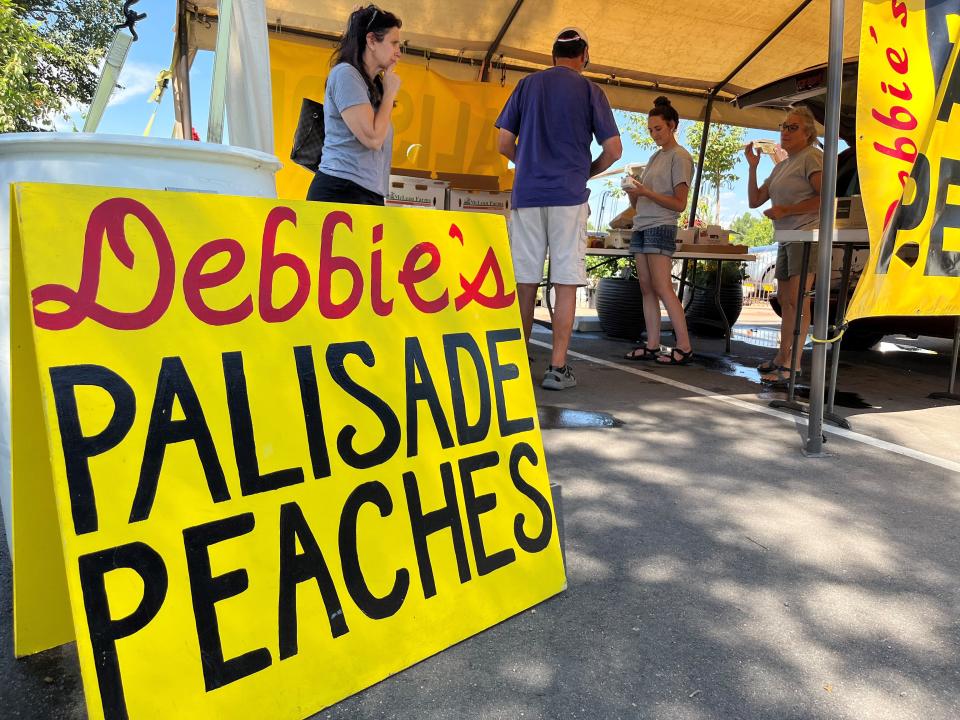How to tell if you're buying real Palisade peaches, Rocky Ford melons and more
August is a crescendo of Colorado-grown crops from peaches to melons to chiles to sweet corn.
But how do you know if what you are buying from the street-side stands or farmers' markets are truly Palisade peaches, Rocky Ford melons, Pueblo chiles or Olathe sweet corn?
That can be as difficult as determining the ripeness of what you are buying.
"It's difficult because you are really depending on the person selling you the peaches to be truthful,'' said Debbie Bridge, who manages the Debbie's Palisade Peaches stand at Bath Nursery, 2000 E. Prospect Road in Fort Collins.
How to tell if you're buying a true Palisade peach
There is no official labeling of Palisade peaches.
Bridge and other vendors said the best way is to ask the vendor if the peaches are from Palisade. Some said you can ask workers at the stand from what growers the peaches came. However, they added some workers may not know.
Another clue includes looking at the boxes of peaches at the stand to see if they have Palisade written on them. Or look to see if the peaches have a California peaches sticker on them. Some vendors cautioned boxes are reused, so the boxes might not have an indicator that they hold Palisade peaches.
Also, a number of grocery chains such as King Soopers, Safeway and Whole Foods sell Palisade peaches along with other Colorado-grown fruits and vegetables.

Bridge knows her prized produce is fresh. Every three to four days, she makes the more than 600-mile roundtrip to McLean Farms in Palisade. She arrives just after the peaches are picked in the cool of the morning, loads them up and drives them back to Fort Collins.
She said when she first started selling Palisade peaches 20 years ago at her Loveland stand, she had a vinyl sign that read "Colorado peaches.''
"People would come to the stand and ask what Colorado peaches were,'' Bridge said. "They wanted to know if the peaches were from Palisade, which they were. But I didn't realize they specifically wanted Palisade peaches because there is something special about peaches grown in the valley by the river.''
It's important to know what you are buying because of taste and cost.
Vendors said regular consumers of Palisade peaches can tell the difference between peaches grown in the Grand Valley of Colorado and those grown in California. Others, not so much — and so you may end up paying Palisade prices for California peaches. Bridge said a box of Palisade peaches weighing about 24 pounds costs $65.
Bridge said you can determine peak peach ripeness by looking at the blossom end of the fruit. She said if it is yellow-green to wait a few days to eat it. If creamy in color or if the peach is slightly flat on the bottom from sitting on the counter, it is ready to eat.
Palisade peaches first arrive at stands in July. Bridge said she just received peaches from the late harvest, which she said produces larger fruit. Colorado State University Extension's website said the best time to buy Colorado peaches is August and September.

What about Rocky Ford melons, Pueblo chiles and Olathe sweet corn?
The Rocky Ford Growers Association formed in 2011 to protect the reputation of its melons, most notably cantaloupe but also watermelon and honeydew.
Only those melons grown in Otero and parts of Crowley County can include stickers that include the Rocky Ford Growers Association label.
A ripe cantaloupe will have a white netting or webbing with golden yellow beneath. Look for fruit with no stem left on. If there is a piece of stem attached, the cantaloupe is not fully ripe and will not ripen. If you hear seeds when you shake the cantaloupe, it is past prime.
Rocky Ford melons are available mid-July to mid-September.
For more information, visit rocky-ford-growers-association.mandccommunications.com/.
The Pueblo Chile Growers Association started in 2015 to go head-to-head with the more-famous Hatch chiles grown in New Mexico.
Donielle Kitzman, vice president of the Visit Pueblo Convention & Visitors Bureau, said the best way to know if you are buying a certified Pueblo chile is to buy from certified Pueblo chile growers and stands and look for the grower organization's stickers on the chiles.
Kitzman said Pueblo chiles differ from Hatch in that they are are bolder in taste and meatier, making them ideal for roasting.
Pueblo chiles start showing up on shelves in August and harvest lasts into October.
For more information about Pueblo chiles, visit pueblochile.org/.
Like Palisade peaches, Olathe sweet corn has no official label designation, so you will need to rely on the truthfulness of vendors.
Reporter Miles Blumhardt looks for stories that impact your life. Be it news, outdoors, sports — you name it, he wants to report it. Have a story idea? Contact him at milesblumhardt@coloradoan.com or on Twitter @MilesBlumhardt.
Fort Collins Peach Festival
When: 11 a.m. to 6 p.m. Saturday, Aug. 27
Where: Holiday Twin Drive-in, 2206 South Overland Trail
Cost: $10. Event includes bands, vendors and more with proceeds benefitting Rotary Clubs of Fort Collins
Website: http://fortcollinspeachfestival.com/
This article originally appeared on Fort Collins Coloradoan: How to tell if you are buying Palisade peaches, Rocky Ford melons

